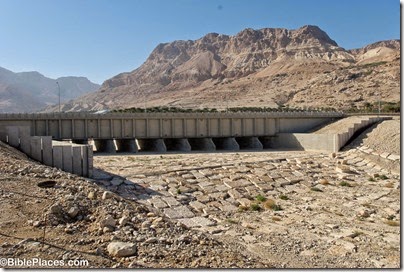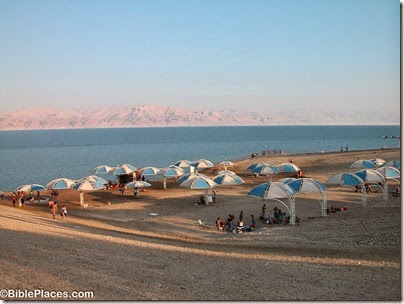The declining water level of the Dead Sea is creating sinkholes which are in turn threatening roads, campsites, and beach areas. This past winter two free beaches along the western shore of the Dead Sea have been closed, leaving visitors with fewer and more expensive options.
Nir Hasson writes in Haaretz on the damage to the area, including this part about the En Gedi area.
About two months later it was decided to close the part of the highway opposite Kibbutz Ein Gedi, which is prone to sinkholes, to be replaced by a bypass road. This has led to transportation snarls. Thousands of day-trippers were stuck in a kilometers-long traffic jam. For the kibbutz members every trip takes between 10 minutes to an hour and a half longer. Nimrod Hacker, the head of the community, says that people reserve a room in the hotel and are unable to get there, goods are stuck, farmers who go down to the orchards get stuck in traffic jams.
The 1.5- kilometer section of highway between the nature reserve and the kibbutz must be the most expensive section in the history of the country. In the past decade tens of millions of shekels have been invested, most of which went to waste because of the sinkholes. In 2009 a new and very expensive bridge was dedicated above Nahal Arugot. In recent years the bridge had been “attacked” by sinkholes, and it was recently put out of service along with the section of the highway.
Many solutions have been proposed, any one of which would require an investment of hundreds of millions of shekels, and perhaps over a billion ($255 million), for a 1.5 kilometer section.
It’s no longer sinkholes, it’s massive sinking of land along 700 meters. The wild animals and the Nahal David and Nahal Arugot nature reserves are also liable to suffer from the road that will be dangerously close to them.
Another blow for Ein Gedi came when the Tamar Regional Council and Netivei Israel, the transportation infrastructure company, decided to close the last free beach at the Dead Sea, along with the gas station, the kiosk and the new camping area that were inaugurated on Sukkot. The regional council invested 4 million shekels in improving the beach, and a festive opening was planned for Passover. In addition, a large percentage of the kibbutz’s date orchards, as well as camping grounds, were abandoned years ago because of the sinkholes.
Closing the last free beach now presents a major challenge for those who want to bathe in the Dead Sea. The last organized beaches charge dozens of shekels per person, and bathers also have to descend steps and terraces or travel in a special train, whose route lengthens by the year, in order to reach the water. In the hotel area you can still swim in Dead Sea water – not at the beach but in the industrial swimming pool built by the Dead Sea Works.
The full article is here.

